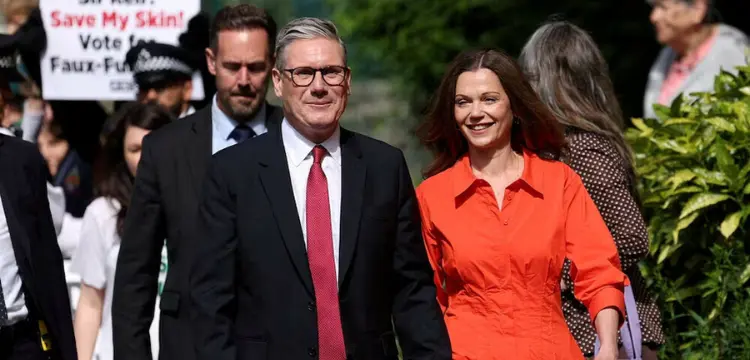The UK Labour Party wins decisively as Sunak concedes the election
Share

Keir Starmer is set to become Britain’s next prime minister as his centre-left Labour Party is projected to win a significant majority in the parliamentary election, ending 14 years of Conservative rule and defeating Rishi Sunak’s party. With many results still pending from Thursday’s vote, Labour has already secured more than 381 out of 650 seats in parliament, with exit polls indicating they might win around 410 seats. It was a devastating night for Sunak and the Conservatives, who have only secured 98 seats so far and are expected to experience their worst defeat in party history, with voters blaming them for a cost-of-living crisis, poor public services, and numerous scandals.
“Tonight, people here and around the country have spoken and they’re ready for change, to end the politics of performance, a return to politics as public service,” Starmer declared after winning his seat in Richmond and Northallerton in northern England. “The change begins right here … You have voted. It is now time for us to deliver.” Sunak admitted defeat, stating he had called Starmer to congratulate him on his victory. “Today power will change hands in a peaceful and orderly manner, with goodwill on all sides,” he said after reclaiming his seat. “There is much to learn and reflect on and I take responsibility for the loss to the many good, hardworking Conservative candidates … I am sorry.”
Read More: Four Pakistanis have been elected in the UK general election 2024
Highlights from Starmer’s Speech:
- “We did it, you campaigned for it, you fought for it, you voted for it and now it has arrived.”
- “Change begins now.”
- “Four and a half years of work, changing the party. This is what it is for. A changed Labour Party, ready to serve our country, ready to restore Britain to the service of working people.”
- “Across our country, people will be waking up to the news. Relieved that a weight has been lifted.”
- “A burden finally removed from the shoulders of this great nation. And now we can look forward again, walk into the morning, the sunlight of hope, pale at first, but getting stronger through the day.”
- “Shining once again on a country with the opportunity after 14 years to get its future back.”
- “Our task is nothing less than renewing the ideas that hold this country together: national renewal.”
- “The fight for trust is the battle that defines our age. It is why we’ve campaigned so hard on demonstrating we are fit for public service.”
- “We have to return politics to public service. Show that politics can be a force for good.”
Despite this substantial victory, polls indicate there is minimal enthusiasm for Starmer or his party, and he assumes office during a period of significant challenges for the country. Britain’s tax burden is poised to reach its highest level since just after World War Two, net debt is almost equal to the annual economic output, living standards have declined, and public services, especially the much-cherished National Health Service plagued by strikes, are struggling.
Starmer has already had to temper some of Labour’s more ambitious initiatives, including its primary green spending commitments, and he has pledged not to increase taxes for “working people.” British finance minister Jeremy Hunt managed to retain his parliamentary seat in southern England on Friday, overcoming a strong challenge from the smaller Liberal Democrat party. Hunt, a Conservative lawmaker who has also served as health and foreign secretary during 11 years in top government positions, was expected to be the night’s biggest casualty as the Conservatives lost seats nationwide.
The severe blow to Conservative support was largely dealt by the right-wing populist Reform UK party, led by Brexit campaigner Nigel Farage, who campaigned vigorously on reducing immigration. Starmer has vowed to revoke the Conservatives’ controversial policy of deporting asylum seekers to Rwanda but will face pressure to find a solution to the influx of people arriving across the Channel in small boats.
Read More: Ukraine’s air force shoots down 21 out of 22 Russian drones in an overnight attack
Within the Conservative party, internal disputes and discussions about its future direction began immediately, with some attributing the failure to abandoning the centre ground while others argued that Reform won over voters who felt the party had strayed from its roots. Reform captured four seats, with Farage himself finally elected to parliament on his eighth attempt, and garnered more votes than the Conservatives across many areas. “There is a massive gap on the centre-right of British politics and my job is to fill it, and that’s exactly what I’m going to do,” a triumphant Farage said. “Believe me, folks, this is just the first step of something that is going to stun all of you.”
Populist Alternative
The rise in support for a populist alternative mirrors recent similar outcomes in Europe, where the far right has been gaining traction. However, unlike in France where Marine Le Pen’s far-right National Rally party made historic gains in an election last Sunday, the British public has largely opted for a centre-left party to bring about change. Starmer has pledged to improve relations with the European Union to address issues created by Brexit, while far-right politicians are gaining success. However, despite his opposition to Brexit, rejoining the European Union is not on the agenda. He may also have to collaborate with Donald Trump in the United States if he wins the November presidential election, but he has vowed to maintain London’s unwavering support for Ukraine.
This election victory represents a remarkable turnaround for Starmer and Labour, which critics and supporters said were facing an existential crisis just three years ago after their 2019 defeat. However, a series of Conservative scandals – most notably the revelations of parties in Downing Street during COVID lockdowns – undermined then-prime minister Boris Johnson, and their substantial poll leads vanished. Liz Truss’ disastrous six-week premiership, following Johnson’s ousting at the end of 2022, cemented the decline, and Sunak was unable to make any significant impact on Labour’s now dominant poll lead. Sunak shocked Westminster and many in his own party by calling the election earlier than necessary in May, with the Conservatives trailing Labour by about 20 points in opinion polls, and his campaign subsequently proved disastrous.
“We deserved to lose. The Conservative Party just appears exhausted and out of ideas,” said Ed Costello, chairman of the Grassroots Conservatives organization, representing rank-and-file members. “But it is not all Rishi Sunak’s fault. It is Boris Johnson and Liz Truss that have led the party to disaster. Rishi Sunak is just the fall guy.”








